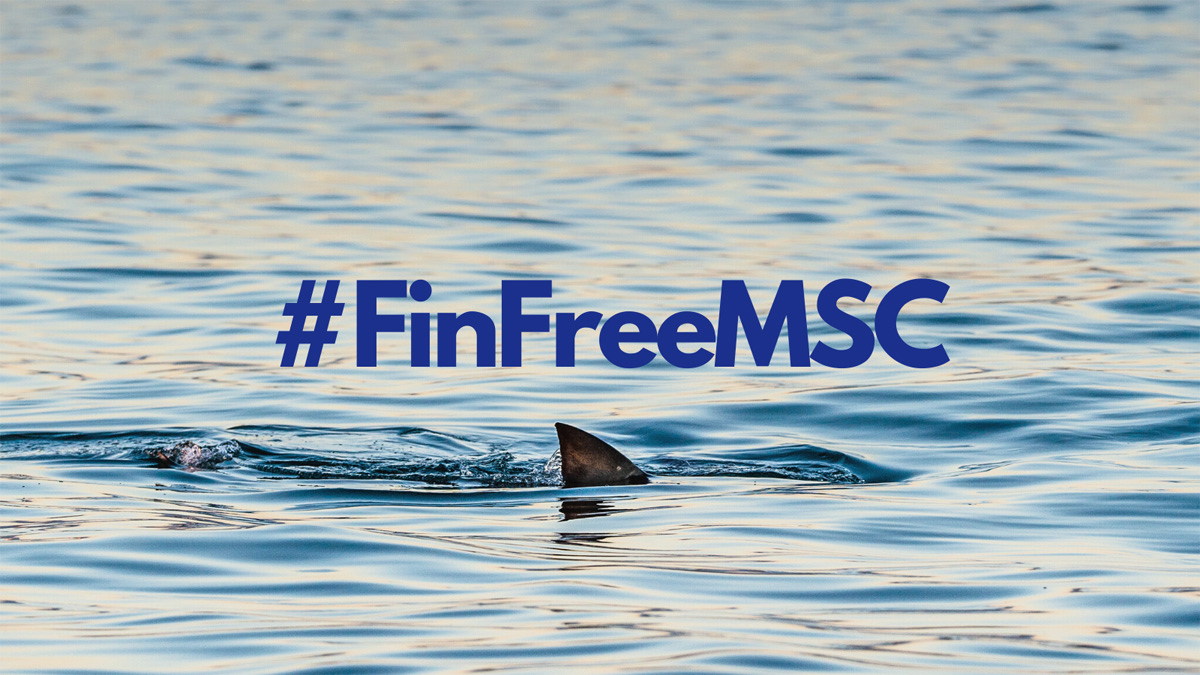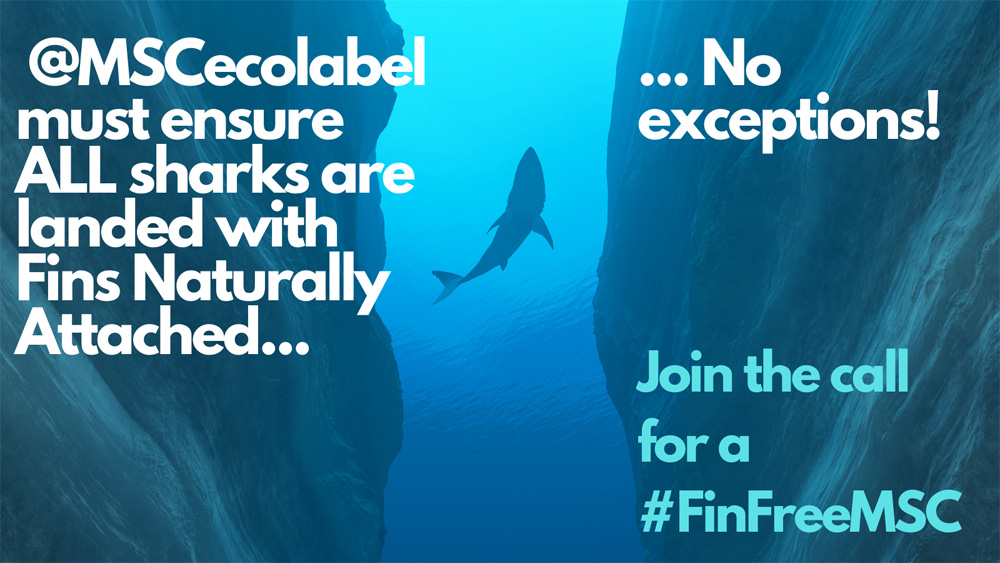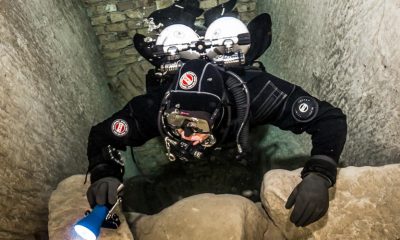Marine Life & Conservation
Calls for Marine Stewardship Council to raise bar on shark finning

A recent report criticises the Marine Stewardship Council (MSC) for failing in its stated ‘zero tolerance’ approach to shark finning and calls for urgent reform.
Shark populations globally are on the brink of collapse under fishing pressure: an estimated 63—273 million sharks are killed each year and numbers of oceanic sharks have dropped by 71% since 1970. A major driver of this unsustainable exploitation is the existence of a lucrative global shark fin trade. Shark finning is illegal across many jurisdictions but bans vary in their effectiveness and enforcement and the practice continues across the ocean, including in MSC-certified fisheries.
This report analyses existing approaches used to enact finning bans, concluding that it is now well-established that the most effective means of banning shark finning is by requiring that all sharks must be landed with Fins Naturally Attached (FNA). Dr. Iris Ziegler of Sharkproject International said:
“Shark finning is a practice which, by its nature, takes place under the radar. The incidences we are aware of may be just the tip of the iceberg. It is absolutely crucial that fisheries require Fins Naturally Attached. This is the only effective means of eliminating shark finning as it closes loopholes and provides the strongest possible foundation for detecting incidences and removing bad actors from fisheries: if monitoring detects fins on board, it is immediately clear that a breach has taken place and sanctions can be imposed.”
An FNA policy is in place in 19 of the world’s 43 foremost shark fishing nations, and is a requirement in jurisdictions including the United Kingdom, United States, European Union, Canada, Costa Rica, South Africa and Brazil. In contrast, this report criticises the MSC, one of the world’s leading seafood sustainability eco-labelling schemes, for failing to fully implement the ban on shark finning it had announced in 2011. The authors are also concerned that MSC has failed to implement a Fins Naturally Attached policy for all certified fisheries that interact with sharks, despite clear global sustainability trends and multiple calls from stakeholders in the decade since the announcement.
Susan Millward, Marine Program Director, Animal Welfare Institute said:
“Fins Naturally Attached is no longer merely ‘best practice’ but increasingly a bare minimum expectation for sustainable fisheries management. It is truly shocking that instead of taking the lead and driving global action against shark finning, the Marine Stewardship Council instead lags more than a decade behind the cutting-edge. MSC may claim to have ‘zero tolerance’ towards shark finning but this rhetoric is not yet matched by its requirements.”
As the MSC continues its five-yearly Fisheries Standard Review with the publication of a potentially revised Standard scheduled for next year, this report concludes by providing recommended actions. The report strongly urges MSC to revise its Standard such that:
• Evidence of shark finning must preclude a fishery upfront from entering the MSC certification process.
• Any fishery interacting with sharks must, as a prerequisite, have a Fins Naturally Attached policy with no exemptions in place at the time of certification.
• Based on objectively verifiable criteria, the risk of finning occurring needs to be assessed and the extent of monitoring and surveillance required for that fishery should be defined according to risk categories (low, medium, high)
Katie Woodroffe of Shark Guardian said:
“It is time for the MSC to listen to stakeholders and seize the opportunity of the Fisheries Standard Review to raise the bar by requiring Fins Naturally Attached as a prerequisite for certification – with no exemptions! In the face of mass extinction, we need to be doing everything in our power to stamp out the horrific practice of shark finning. Fleets around the world have successfully implemented Fins Naturally Attached and demonstrated it to be a feasible and effective solution. There is absolutely no reason why fisheries which have been MSC-certified, or which aspire to certification, should not follow suit.”
For more information on the work of Shark Guardian visit their website by clicking here.
Marine Life & Conservation
Double Bubble for Basking Sharks

 The Shark Trust is excited to announce that, for two more days only, all donations, large or small, will be doubled in the Big Give Green Match Fund!
The Shark Trust is excited to announce that, for two more days only, all donations, large or small, will be doubled in the Big Give Green Match Fund!
Donate to Basking in Nature: Sighting Giants
The Shark Trust is hoping to raise £10k which will be doubled to £20k. This will go towards Basking in Nature: Sighting Giants. And they need YOUR help to reach they’re goal.
The Shark Trust’s citizen science project is to monitor and assess basking sharks through sightings; encouraging data collection, community engagement, and promoting nature accessibility. This initiative aims to enhance health and wellbeing by fostering a deeper connection with British Sharks.
Campaign Aims
- Increase citizen science reporting of Basking Sharks and other shark sightings to help inform shark and ray conservation.
- Provide educational talks about the diverse range of sharks and rays in British waters and accessible identification guides!
- Create engaging and fun information panels on how to ID the amazing sharks and rays we have on our doorstep! These can be used on coastal paths around the Southwest. With activities and information on how you can make a difference for sharks and rays!
- Promote mental wellbeing through increasing time in nature and discovering the wonders beneath the waves!
Donate, and double your impact. Click Here
Marine Life & Conservation
Leading UK-based shark conservation charity, the Shark Trust, is delighted to announce tour operator Diverse Travel as a Corporate Patron

 Corporate Patrons provide a valuable boost to the work of The Shark Trust. The Trust team works globally to safeguard the future of sharks, and their close cousins, the skates and rays, engaging with a global network of scientists, policymakers, conservation professionals, businesses and supporters to further shark conservation.
Corporate Patrons provide a valuable boost to the work of The Shark Trust. The Trust team works globally to safeguard the future of sharks, and their close cousins, the skates and rays, engaging with a global network of scientists, policymakers, conservation professionals, businesses and supporters to further shark conservation.
Specialist tour operator Diverse Travel has operated since 2014 and is committed to offering its guests high quality, sustainable scuba diving holidays worldwide. Working together with the Shark Trust will enable both organisations to widen engagement and encourage divers and snorkellers to actively get involved in shark conservation.
“Sharks are truly at the heart of every diver and at Diverse Travel, we absolutely share that passion. There is nothing like seeing a shark in the wild – it’s a moment that stays with you forever!” says Holly Bredin, Sales & Marketing Manager, Diverse Travel.
“We’re delighted to celebrate our 10th year of business by becoming a Corporate Patron of the Shark Trust. This is an exciting partnership for Diverse and our guests. We will be donating on behalf of every person who books a holiday with us to contribute towards their vital shark conservation initiatives around the world. We will also be working together with the Trust to inspire divers, snorkellers and other travellers to take an active role – at home and abroad – in citizen science projects and other activities.”
Paul Cox, CEO of The Shark Trust, said:
“It’s an exciting partnership and we’re thrilled to be working with Diverse Travel to enable more divers and travellers to get involved with sharks and shark conservation. Sharks face considerable conservation challenges but, through collaboration and collective action, we can secure a brighter future for sharks and their ocean home. This new partnership takes us one more valuable step towards that goal.”
For more information about the Shark Trust visit their website here.
For more about Diverse Travel click here.
-

 News3 months ago
News3 months agoHone your underwater photography skills with Alphamarine Photography at Red Sea Diving Safari in March
-

 News3 months ago
News3 months agoCapturing Critters in Lembeh Underwater Photography Workshop 2024: Event Roundup
-

 Marine Life & Conservation Blogs3 months ago
Marine Life & Conservation Blogs3 months agoCreature Feature: Swell Sharks
-

 Blogs2 months ago
Blogs2 months agoMurex Resorts: Passport to Paradise!
-

 Blogs2 months ago
Blogs2 months agoDiver Discovering Whale Skeletons Beneath Ice Judged World’s Best Underwater Photograph
-

 Gear Reviews2 weeks ago
Gear Reviews2 weeks agoGEAR REVIEW – Revolutionising Diving Comfort: The Sharkskin T2 Chillproof Suit
-

 Marine Life & Conservation2 months ago
Marine Life & Conservation2 months agoSave the Manatee Club launches brand new webcams at Silver Springs State Park, Florida
-

 Gear Reviews3 months ago
Gear Reviews3 months agoGear Review: Oceanic+ Dive Housing for iPhone



















